 Ahn, Woo-Kyoung. 2022. Thinking 101: How to Reason Better to Live Better. Flatiron. **
Ahn, Woo-Kyoung. 2022. Thinking 101: How to Reason Better to Live Better. Flatiron. **
Yet another book about cognitive biases, mixing psychology and self-help. The one distinction between this and similar books is that the author supplies suggestions for overcoming each of the eight biases she examines. These include the allure of fluency, confirmation bias, causal attribution, reliance on anecdotes, negativity bias, biased interpretation, perspective-taking, and delayed gratification. Bottom line: only learning to think better will lead to a better world. (post) (Read May 2024)
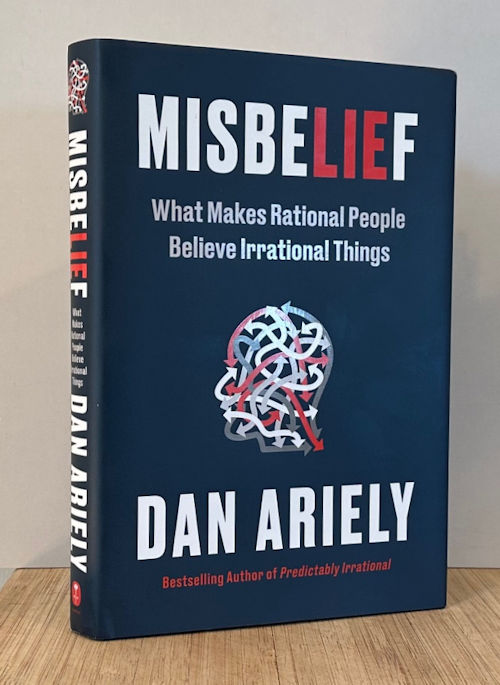 Ariely, Dan. 2023. Misbelief: What Makes Rational People Believe Irrational Things. Harper. ***
Ariely, Dan. 2023. Misbelief: What Makes Rational People Believe Irrational Things. Harper. ***
This book focuses on the process of how people form false beliefs, which can include conspiracy theories but which Ariely prefers to call “misbeliefs.” It was inspired by accusations of Ariely himself being part of a conspiracy theory involving the Covid pandemic, due, he discovered, to dicey selectively edited videos seen by people who then tried to expose a supposed fraud. Then the book goes deeper into the steps by which misbeliefs form, with a key point that it often starts out in situations of stress and uncertainty. Followed by the need to identify a villain in order to regain control of the world, and to reduce that complex, ambiguous world into a simple, comforting story. And social media now makes it easy to find communities of like-believers, even at the expense of losing family and friends. (post) (Read Oct 2023)
 Ariely, Dan. 2008. Predictably Irrational: The Hidden Forces That Shape Our Decisions. Harper. ***
Ariely, Dan. 2008. Predictably Irrational: The Hidden Forces That Shape Our Decisions. Harper. ***
One of the earliest popular books that summarizes various findings of experimental psychology in recent decades that reveal the biases of human nature. Key point: traditional economics assumed that people are rational individuals. But in fact, humans are not only irrational, they are irrational in predictable, systematic ways. (post)
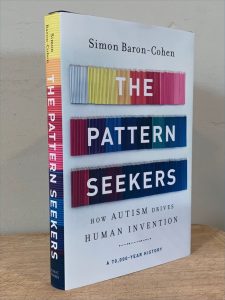 Baron-Cohen, Simon. 2020. The Pattern Seekers: How Autism Drives Human Invention. Basic Books. ** 1/2
Baron-Cohen, Simon. 2020. The Pattern Seekers: How Autism Drives Human Invention. Basic Books. ** 1/2
This uneven book belabors some basic ideas ( if-and-then ) and perhaps oversells its provacative thesis, at least in its subtitle. The core idea is that human invention flowed from the evolution in the brain of a systemizing mechanism (or pattern seeking) some 70,000 years ago, and that this system and a complementary empathy circuit reside in all minds to varying degrees. Thus five types of brains along a spectrum, one extreme being Extreme Type S, in which the systemizing mechanism prevails; people of this type include inventors (example of Thomas Alva Edison) who are often driven and eccentric, and autistic people. The evidence includes many case studies, genetic studies via 23andme, and analyses of Silicon Valley entrepreneurs, who have more than usual autistic children. (BTW despite a popular movement to say person with autism, as if it could be cured, scientists say autistic person, since it s an inherent trait, not a disease, and except in extreme cases can be considered a feature, not a bug.) The future should be the acceptance of neurodiversity and finding appropriate education and work positions for the autistic, to take full advantage of their special skills. (post) (Read Dec 2021)
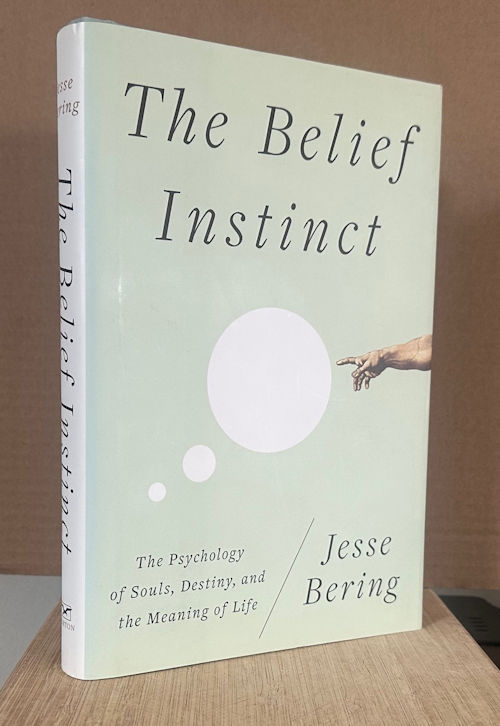 Bering, Jesse. 2011. The Belief Instinct: The Psychology of Souls, Destiny, and the Meaning of Life. Norton. ****
Bering, Jesse. 2011. The Belief Instinct: The Psychology of Souls, Destiny, and the Meaning of Life. Norton. ****
Bering follows the books by the “new atheists” in the 2000s with a study of *why* people form beliefs about souls and supernatural beings in the first place. Answers come from cognitive psychology and clinical experiments with children. A key idea is the “theory of mind” that children eventually form as they realize that other people have minds of their own. Questions about purpose, destiny, and the meaning of life are due to the acting up of this theory of mind. Thus we see signs everywhere, like God’s intent in a hurricane. (And people without theory-of-mind sympathies, like some autistics, are actually better at perceiving the world as it actually is.) Similar analyses consider the afterlife and the human propensity to ask “why?” about every catastrophe, as if everything happens due to some hidden reason. Author concludes that God is an adaptive illusion, a part of human nature that is never likely to go away. Still, that some of us can see around this illusion is a significant turning point in human history, allowing us to appreciate ourselves for what we really are. (post) (Read Sep 2013)
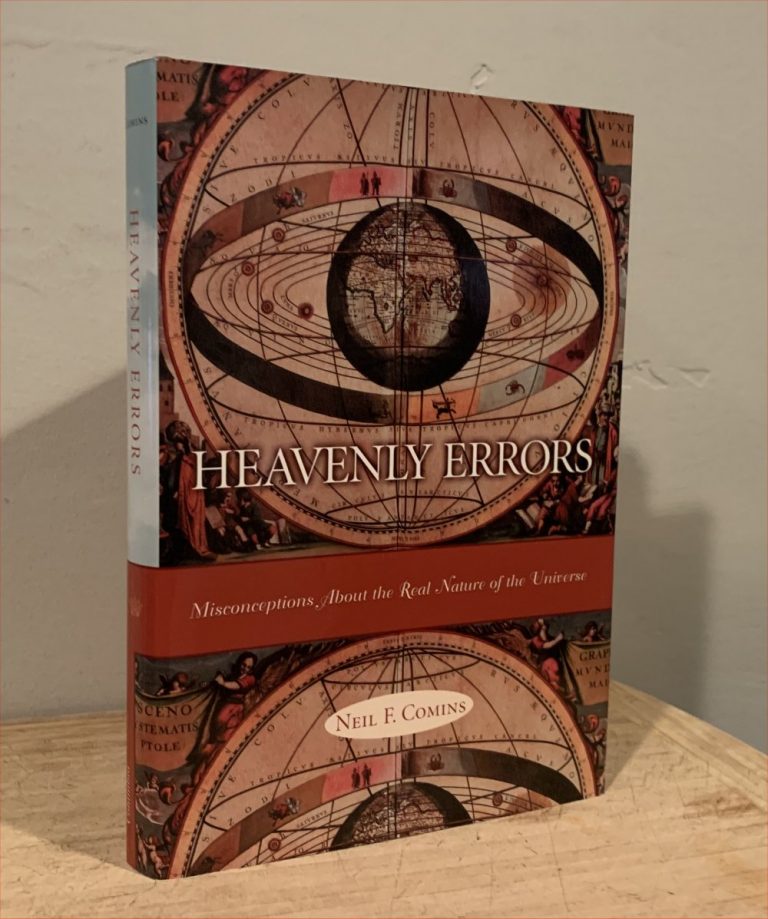 Comins, Neil F.. 2001. Heavenly Errors: Misconceptions about the real nature of the universe. Columbia University Press. ***
Comins, Neil F.. 2001. Heavenly Errors: Misconceptions about the real nature of the universe. Columbia University Press. ***
This book covers such misconceptions as the density of the asteroid belt; why the seasons change; the source of the sun s energy; what causes the tails of comets; what causes the moon s phases; the causes of the tides; and so on. But it also explains where these misconceptions come from (cartoons; crude science fiction; pseudoscience in the media; the web), covers why humans draw the wrong conclusions about so many things; how to correct such ideas (with the usual long list of critical thinking guidelines). Our brains evolved to help us survive, not to comprehend the cosmos. We form our personal cosmologies in our teens, often shaped by religion; they are difficult to revise, but the reward is intellectual freedom. (post)
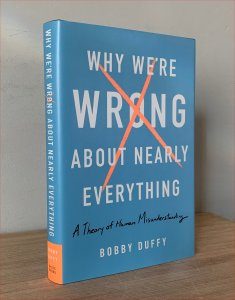 Duffy, Bobby. 2019. Why We’re Wrong About Nearly Everything: A Theory of Human Misunderstanding. Basic Books. ***
Duffy, Bobby. 2019. Why We’re Wrong About Nearly Everything: A Theory of Human Misunderstanding. Basic Books. ***
This book isn t aligned with Shermer or Shtulman as much as to Rosling s FACTFULNESS in its focus on contemporary issues. Duffy studies where people s views of the world are wrong, then shows which biases or social effects cause those views. Many of us get lots of basic facts wrong, due to faulty thinking, media and politicians, and our delusions; overcoming these delusions comes from realizing the complexity of the problem. Topics include health, sexual, and money matters; immigration, religion, crime; politics including Brexit and Trump (both case studies for understanding how our delusions are driven by preexisting beliefs and wishful thinking); filtering and bubbles; foreign aid. The general trend is that people overestimate how bad things are. Which country is the most wrong? Italy. 2nd place: US. Techniques to be less wrong: beware rosy retrospection (i.e. the past was better than the present); don t deny emotions but challenge the thought; avoid the extremes; beware personal experience; learn to recognize fake news; cultivate critical, statistical, and news literacy. (very long notes with lots of examples)
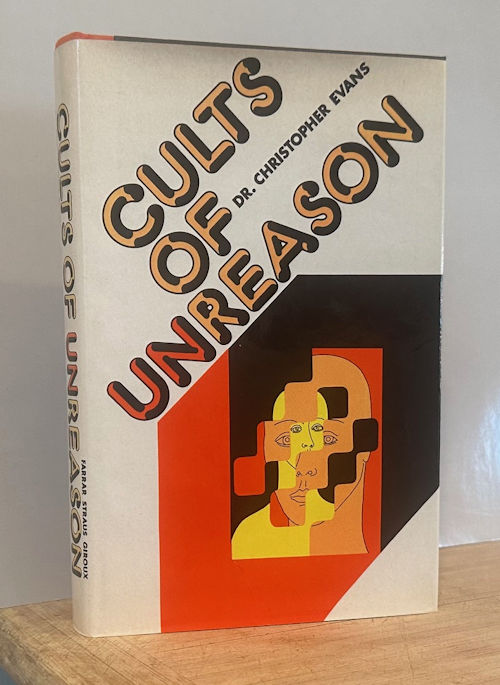 Evans, Christopher. 1974. Cults of Unreason. Farrar, Straus and Giroux. ***
Evans, Christopher. 1974. Cults of Unreason. Farrar, Straus and Giroux. ***
The British computer scientist and psychologist (not to be confused with several others named Christopher Evans) addresses various pseudo-scientific movements that were popular in the 1950s and 60s and 70s. First, and taking nearly half the book, is Scientology and its founder L. Ron Hubbard and his earlier “invention” of Dianetics. Hubbard was a pulp science fiction writer and, ironically, his ideas initially gained traction through the credulousness of one of the leading science fiction magazine editors of the ’50s, John W. Campbell Jr. The second part is about flying saucers, recounting much familiar material. Third is about “black boxes,” devices with inputs and outputs and nothing in between, which were claimed to detect “vibrations” of various ailments. Their purveyors made lots of money. Fourth is about the “Mystic East” and the attraction in the ’70s of yoga, karma, mystical powers, and reincarnation. Notably, Evans finds some amount of sympathy for each group; he understands their motives. Those motives are no different than those behind similar frauds of the 18th century, or perhaps even the ancient religions. (post) (Read Reread May 2025)
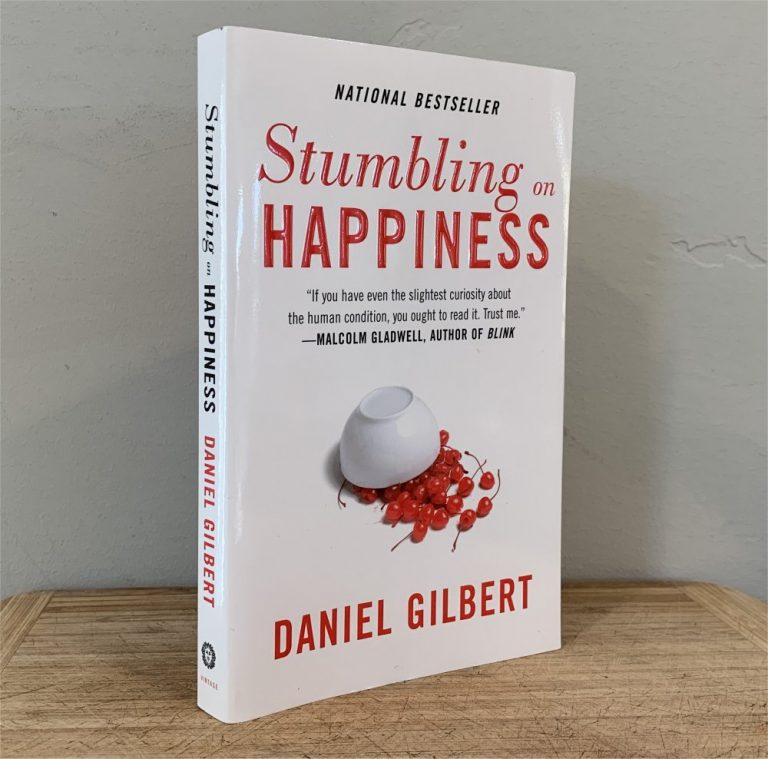 Gilbert, Daniel. 2007. Stumbling on Happiness. Vintage Books. ***
Gilbert, Daniel. 2007. Stumbling on Happiness. Vintage Books. ***
The Harvard psychologist explores why people aren t very good about identifying what makes them happy, or even understand what happiness is. The book is blurbed with various paradoxical scenarios that play to this theme, e.g. Why are lovers quicker to forgive their partners for infidelity than for leaving dirty dishes in the sink? Overall answers: people aren t good at anticipating the future; and since most people think they are special, they don t rely on other people to testify about what makes them happy. The answer to the problem is, people *should* rely on the testimony of others. Trust them. (Shown here is my 2007 reprint edition of the 2006 original edition.) (post)
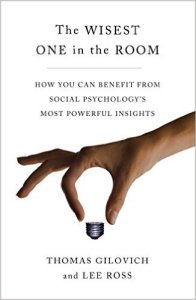 Gilovich, Thomas, & Ross, Lee. 2015. The Wisest One in the Room: How You Can Benefit From Social Psychology s Most Powerful Insights. Free Press. ***
Gilovich, Thomas, & Ross, Lee. 2015. The Wisest One in the Room: How You Can Benefit From Social Psychology s Most Powerful Insights. Free Press. ***
Another reflection on the kinds of psychological illusions people are subject to, now extended to advice about how to apply them to personal and social issues. On the former are five pillars of wisdom : the objectivity illusion (and problems with media balance ); priming and the fundamental attribution error; how framing shapes understanding; how behaving can bring about results, and how good and evil are a matter of perception; and various mental biases like cherry-picking, intuitive and rational thinking, confirmation bias. The second part of the book is about Wisdom Applied : act like a happy person, applying the peak-end rule, valuing experiences over possessions, and avoiding regrets; get along with others by being a sophisticated consumer of news, by creating situations where resolutions must succeed, focus on the middle ground of people who aren t invested in the status quo and so can t afford to change; and finally two chapters about how to apply these ideas to social problems in America, and addressing climate change by the world. The epilogue describes how Nelson Mandela united South Africa with a rugby match, using all of the five elements in the last half of this book. (summary part 1; summary part 2)
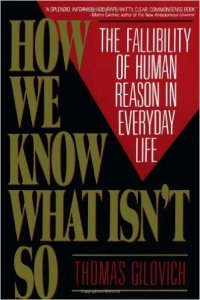 Gilovich, Thomas. 1993. How We Know What Isn’t So: The Fallibility of Human Reason in Everyday Life. Free Press. ***
Gilovich, Thomas. 1993. How We Know What Isn’t So: The Fallibility of Human Reason in Everyday Life. Free Press. ***
One of the earliest books about how unconscious mental biases influence how people receive and understand information, with discussions of the Lake Wobegon effect, confirmation bias, etc.; how stories are told via sharpening and leveling to make them serve higher causes than accuracy; how people should develop habits of mind to correct such biases, including the value of a science education with the concepts of control groups, regression, doubt, and uncertainty. (post)
 Gottschall, Jonathan. 2021. The Story Paradox: How Our Love of Storytelling Builds Societies and Tears Them Down. Basic Books. *** 1/2
Gottschall, Jonathan. 2021. The Story Paradox: How Our Love of Storytelling Builds Societies and Tears Them Down. Basic Books. *** 1/2
The paradox is that stories are necessary, but poisonous in some circumstances. The writer makes a host of key points, some familiar, some new to me. Storytellers rule the world, as used by totalitarian regimes including church dogmas, with the most contagious stories ever told being the gospels of Jesus. Conspiracies theories are actually conspiracy stories. Stories are about characters trying to resolve predicaments, and they have moral dimensions. They can evoke empathy for people different than the reader, but at the same time require a villain. We inherit our stories, as others inherit theirs (somewhat undermining the notion of essential evil). Narrative is reductionist, simplifying the world; we defend our stories to avoid loss of meaning. The escape from the rule of stories in the Dark Ages was by evidence that lifted us into the Enlightenement. But now we face one of the most successful storytellers in history: Big Blare [i.e. Trump]. Solutions? Don’t assault stories per se; find out which narratives about reality are true and which are false. And yet authoritarian system have been more common and stable over history that democracies. My own thoughts in the post conclude with the notion that perhaps both democracy and science are passing fades in human history, destined to give way inevitably to yet new authoritarian regimes (including Trump’s) and their “stories”; and how this spills over into the plausibility of traditional science fiction scenarios. (post) (Read May 2024)
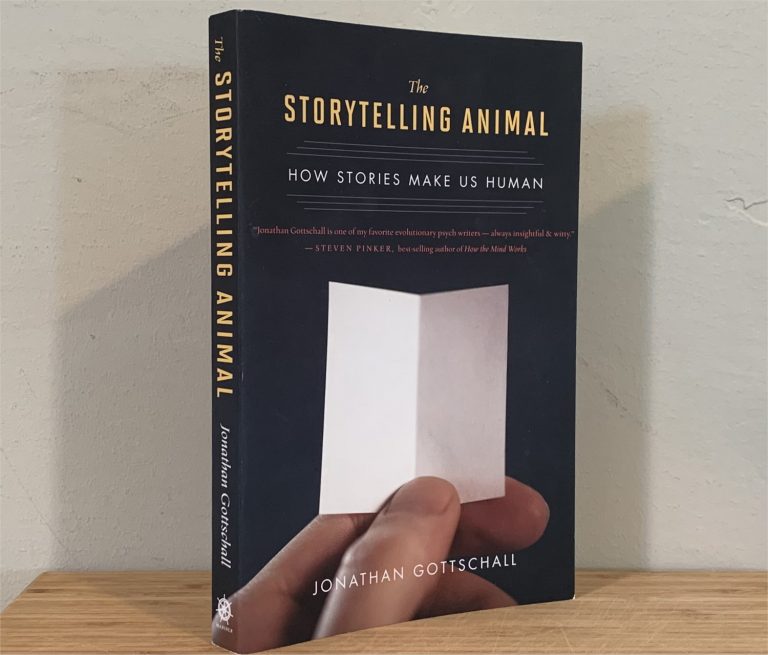 Gottschall, Jonathan. 2013. The Storytelling Animal: How Stories Make Us Human. Mariner. ***
Gottschall, Jonathan. 2013. The Storytelling Animal: How Stories Make Us Human. Mariner. ***
How humans think of everything in terms of story, from how children play to adult pop music, daydreams, courtroom cases, TV commercials, even pro wrestling. Stories are about conflict, and are attractive perhaps as rehearsals for situations we will face in real life. Religion conveys history through stories. Our memories are misremembered to make better stories. The lessons here are to acknowledge the power of stories; they re not wastes of time. Be tolerant of national and religious myths; but beware your inner storyteller locking into the overdrive of conspiracy theories. (post)
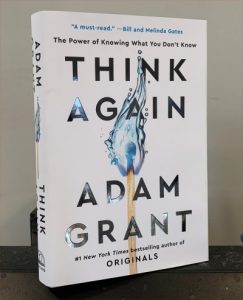 Grant, Adam. 2021. Think Again: The Power of Knowing What You Don’t Know. Viking. ***
Grant, Adam. 2021. Think Again: The Power of Knowing What You Don’t Know. Viking. ***
With the flavor of a self-help book (it s full of examples and anecdotes and a list of take-aways) this asks you to consider knowing what you don t know in order to become a life-long learner (just as science asks you to update provisional conclusions with new evidence). Much of this echoes the themes of psychological biases and perceptual illusions from many other books, but there were several key ideas, some already familiar, that I took away. First: the ways in which those who don t think like scientists are inclined to preach, prosecute, or politick (an interesting tripartite which strikes me as how most of the non-scientific world works). Others: ask what evidence would change your mind; consider complexity (there are more than two sides to every story; avoid black & white, right & wrong); abandon best practices; throw out your ten-year plan. I take issue with his notion about best practices, which was essential in aerospace when I worked there, but his point is merely to never think your practices are perfect. Well of course; what I did in aerospace was to continually improve our best practices. (post)
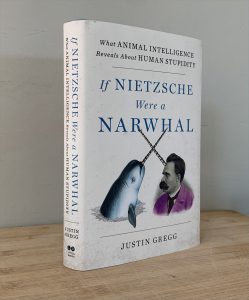 Gregg, Justin. 2022. If Neitzsche Were a Narwhal: What Animal Intelligence Reveals About Human Stupidity. Little, Brown. ***
Gregg, Justin. 2022. If Neitzsche Were a Narwhal: What Animal Intelligence Reveals About Human Stupidity. Little, Brown. ***
It s not that humans are stupid, it s that human intelligence is partly counterproductive; humans are too smart for their own good, perhaps even threatening our survival as a species. The book describes humans propensity to ask why questions, our ability to lie, our awareness of death, our assigning moral judgments to harmless things that in turn can justify genocide, how humans are conscious of more things than animals, and especially the idea of prognostic myopia, humans inability to anticipate future outcomes. Gist: human intelligence has both good and bad consequences, but you don t get the one without the other. Also: animals are just as happy in their own ways as humans are. And most of them will outlast the human species. (summary; part 2) (Read Sep 2022)
 Haidt, Jonathan. 2024. The Anxious Generation: How the Great Rewiring of Childhood Is Causing an Epidemic of Mental Illness. Penguin. ***
Haidt, Jonathan. 2024. The Anxious Generation: How the Great Rewiring of Childhood Is Causing an Epidemic of Mental Illness. Penguin. ***
Expanding on a theme from Haidt & Lukianoff’s THE CODDLING OF THE AMERICAN MIND, Haidt here focuses on smartphones and social media and their deleterious effects. How is this worse than any past moral panics against new technology, from radio and TV and comic books and video games, and for that matter scrolls in ancient Greece? Well, he has data. There’s been a rise in teenage anxiety, depression, self-harming, and suicide among Gen Z beginning around 2010. He revisits the decline of play-based childhood, and the rise of phone-based childhood, how girls are more affected by social media than boys, and at the end has suggestions for “collective actions” for healthier childhoods: relax laws that over-protect children in the real world; schools should encourage more free play and recess. Parents should be gardeners, not carpenters. Delay introducing phones, instead find part-time jobs, tech-free camps, or take a gap year. I remain skeptical — it sounds like a variation of the conservative screed that life was better in the old days — but he does have data about actual harm. (post) (Read Dec 2024)
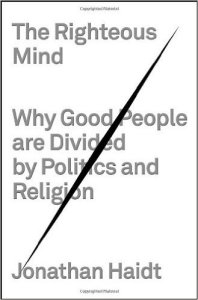 Haidt, Jonathan. 2012. The Righteous Mind. Pantheon. *****
Haidt, Jonathan. 2012. The Righteous Mind. Pantheon. *****
Social psychologist Haidt uses studies into moral sentiments around the world to develop ideas about the foundations of morality, especially to expand the standard liberal ideal that focuses on egalitarianism, with the idea that morality is all about care vs. harm, fairness vs. cheating, liberty vs. oppression. These are Western, educated values; in contrast, in other parts of the world, other sentiments are just as important: loyalty vs. betrayal, authority vs. subversion, sanctity vs. degradation. In Western countries, those sensitive to all six are conservative; those sensitive mostly to egalitarianism, fairness, and liberty are liberals. He considers these foundations in terms of evolutionary psychology and group selection, and examines various political issues in their light. Intuition and reasoning are both kinds of cognition [cf. Kahneman], and Haidt explores why our minds evolved this way; discusses group selection, why it went out of fashion, how its problems were solved by the earliest evolution of religion. Religion is about belonging to a group with shared beliefs, and it evolved to discourage selfish behavior (the earlier issue with group selection). Morality is about what works, not necessarily what is right, though as a policy, utilitarianism is as good as any [and thus Haidt aligns with Harris and Shermer]. And so: conservative minds react more strongly to threat and fear; liberals are more responsive to variety and new experiences. He describes the differing Grand Narratives of the left and the right: the struggle for equality and happiness, vs. the struggle to return to a golden past. It is much more complex than that some people are good, and others are evil. Liberalism and conservatism are a yin and yang, complementary, and both necessary.
[intro; longer discussion; wrap-up, in which I speculate about some issues Haidt does not discuss]
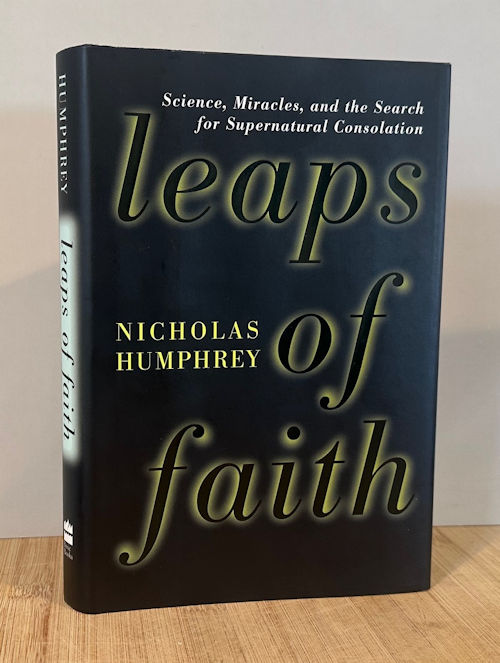 Humphrey, Nicholas. 1996. Leaps of Faith: Science, Miracles, and the Search for Supernatural Consolation. Basic. *** 1/2
Humphrey, Nicholas. 1996. Leaps of Faith: Science, Miracles, and the Search for Supernatural Consolation. Basic. *** 1/2
The British neuropsychologist has an interesting take on the attraction, in the 20th century, of paranormal phenomena, including psychokinesis and extra-sensory perception: it’s driven by the need to replace the comforts of traditional religious beliefs, which have been discredited by science. Thus the paranormal ‘project’ has been to discredit science, the materialist view of the world. But the project has failed. Evidence is too scattershot; paranormal effects seem only to work in shows, and are never used in daily life. So why does the public still believe? A mixture of personal experience, external authority, and a priori reasoning. There are logical reasons why these explanations fail. Further (as Isaac Asimov explained years ago) the existence of such paranormal phenomena would undermine the very forces that brought about our species. (post) (Read Reread May 2025)
 Hutson, Matthew. 2012. The 7 Laws of Magical Thinking: How Irrational Beliefs Keep Us Happy, Healthy, and Sane. Hudson Street Press. ****
Hutson, Matthew. 2012. The 7 Laws of Magical Thinking: How Irrational Beliefs Keep Us Happy, Healthy, and Sane. Hudson Street Press. ****
Yet another book about irrational beliefs and cognitive illusions! The difference with the others is that Hutson a journalist who s only ever written this one book takes a counter-intuitive, playful stance. Give in to your irrational beliefs, Hutson says, at least superficially, at least in some corner of your mind. You ll be happier! And you can retain your rational understanding that these beliefs aren t actually true, if pretending they re true calms your nerves. The seven laws : Objects carry essences; Symbols have power; Actions have distant consequences; The mind knows no bounds; The soul lives on; The world is alive; Everything happens for a reason. And finally how The world is sacred. Of course, all of these are untrue, as physicists like Carroll and Wilzcek patiently explain. But if believing in them makes you happy and they result in no real-world consequences then why not live in a world of fantasy? (post)
Kahane, Howard, & Cavender, Nancy, & Kahane, Howard. 2017. Logic and Contemporary Rhetoric: The Use of Reason in Everyday Life. Belmont CA: Wadsworth. ****
This is a college textbook about the types of fallacious arguments one sees in politics, advertising, news, and textbooks ad hominem, straw man, false dilemma, begging the question, biased statistics; the list goes on. With many examples from current news and advertising. The point is both to understand where others arguments fail, and to try to avoid such invalid reasoning yourself. I read the 3rd edition, by Kahane alone, back around 1975. This was the best text I ever read in college. There have been many editions since; apparently it s a standard. Relevant now more than ever. Note these rhetorical fallacies pre-exist more modern understanding of the psychological biases that lead people to use them, self-righteously; for those see Gilovich, McRaney, and Kahneman. (The image shows the 12th edition, co-written by Nancy Cavender.) (post)
 Kahneman, Daniel. 2011. Thinking, Fast and Slow. Farrar, Straus and Giroux. *****
Kahneman, Daniel. 2011. Thinking, Fast and Slow. Farrar, Straus and Giroux. *****
Perhaps the most influential book of the past couple decades on the subject of human mental biases, how the ways in which we think entail errors of perception, and employ heuristics that are often but not always true. It s a summary of the author s own work (along with Amos Tversky), for which he won a Nobel Prize. The essential model is that our brain operates at two levels System 1 is automatic, quick, and involuntary; System 2 requires efforful mental attention. Most of what we think and do originates in the first; when things get difficult the second takes over, and normally has the last word. A long, detailed book that looks at how these systems underlie our biases and illusions, how we make choices, and how we think about life. (post)
 Keltner, Dacher. 2023. Awe: The New Science of Everyday Wonder and How It Can Transform Your Life. Penguin Press. **
Keltner, Dacher. 2023. Awe: The New Science of Everyday Wonder and How It Can Transform Your Life. Penguin Press. **
UC psychology prof and adviser to Pixar says the way to live a good life is to seek out sources of awe, which he sees an emotion (and not science fiction’s “sense of wonder,” of which the author seems unaware). The author’s research into emotions (with Jonathan Haidt for a while) identified eight themes from personal stories in which they experienced awe: moral beauty; collective effervescence; nature; music; visual design; the spiritual and religious; life and death; and epiphanies, sudden insights into the meaning of life. It’s all about perceiving that everything is part of a system; awe is about perceiving changes in those systems. These are decent points — we should all try looking at the big picture beyond our personal circumstances — but the book is prolonged by endless anecdotes and case studies. Also, Keltner speaks of “purpose” when he really should be speaking about “function” and what benefits such an emotion would provide over those who didn’t feel it. (post)
 Levitan, Dave. 2017. Not a Scientist: How Politicians Mistake, Misrepresent, and Utterly Mangle Science. Norton. ***
Levitan, Dave. 2017. Not a Scientist: How Politicians Mistake, Misrepresent, and Utterly Mangle Science. Norton. ***
The author explores a dozen or so kinds of mistakes that are typically behind any politician s use of the phrase I m not a scientist, but and illustrates each with several detailed examples. These mistakes include oversimplifying, cherry-picking, demonizing, citing disreputable websites, credit-snatching, flat out fabrication, and so on. While the author says he doesn t try to attribute motives to most of these, the vast majority of examples are from Republicans, and my gloss reveal obvious motivations: to maintain the status quo, protect the interests of big business, promote xenophobic or religious agendas. (post)
 Levitin, Daniel J.. 2016. A Field Guide to Lies: Critical Thinking in the Information Age. Dutton. ***
Levitin, Daniel J.. 2016. A Field Guide to Lies: Critical Thinking in the Information Age. Dutton. ***
Complementing Ariely s book, this summarizes how to think about numerical and journalistic claims with the aim of evaluating the world and know what is likely to be so. With discussions of statistics, surveys, misleading graphs; expertise and sources of information and counter-knowledge; how science works, logical fallacies, and Bayesian thinking. (post)
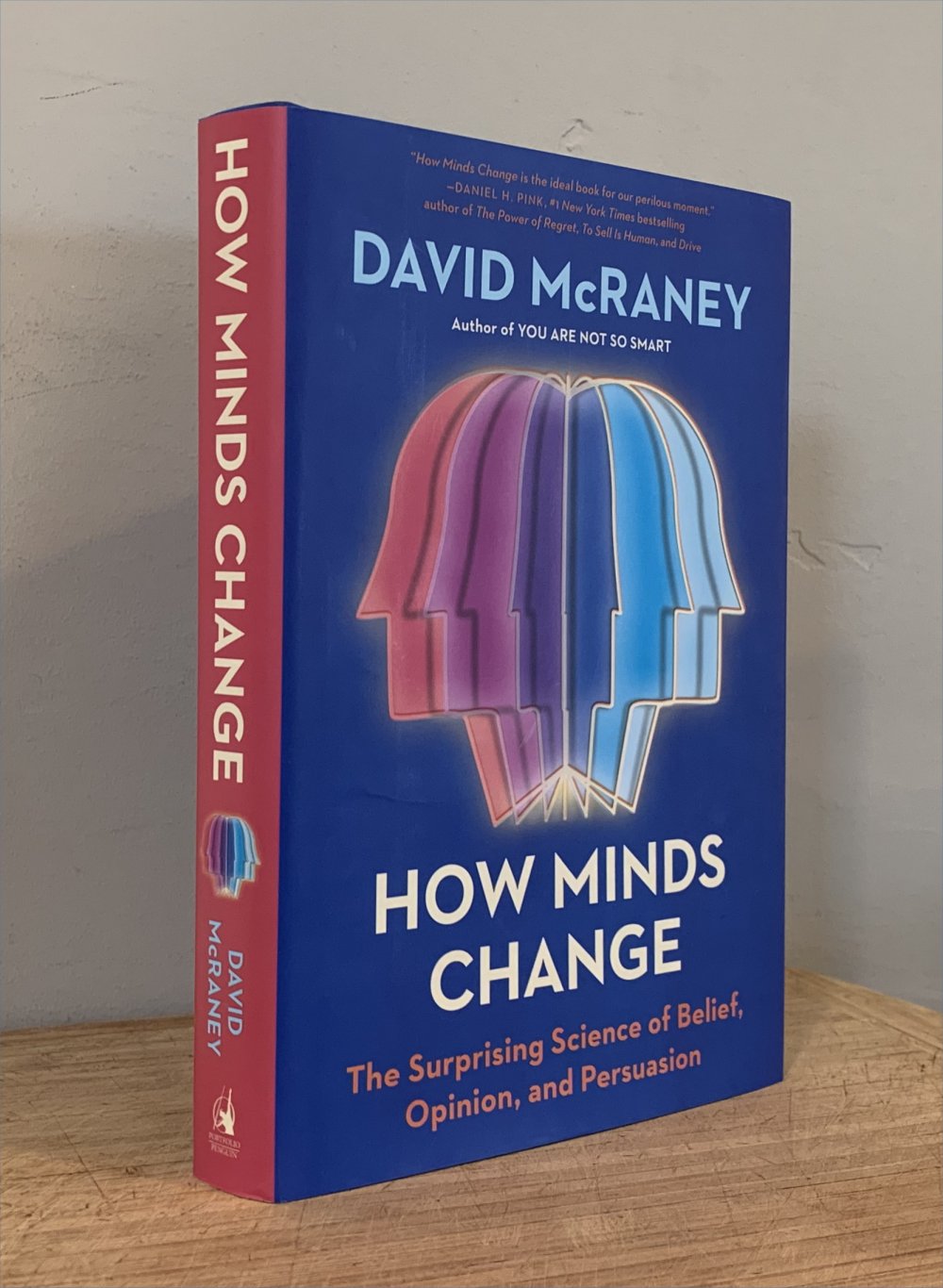 McRaney, David. 2022. How Minds Change: The Surprising Science of Belief, Opinion, and Persuasion. Portfolio. ****
McRaney, David. 2022. How Minds Change: The Surprising Science of Belief, Opinion, and Persuasion. Portfolio. ****
Contrary to the by-now-conventional wisdom that people don t change their minds even when presented with evidence that challenges their beliefs (they double down, their identity or community membership threatened), McRaney explores the situations where and reasons why people *do* change their minds. The main lesson is that changing minds isn t about winning arguments; it s about discussing with another person why and how they came to believe what they do. To this end the author investigates various street epistemologies like Peter Boghossian s, in which the aim is to make a person reflect, and not to challenge them with facts. Also: some people just need to get out into the world (e.g. those who escaped the Westboro Baptist Church); how arguing and debating are good things (justifying confirmation bias! and cuing group selection); and how the history of social change shows how the ability to change minds is a strength, otherwise society would not have evolved. Bonus: the explanation for the dress. Final thought: consider *why* anyone should want to change someone s mind (post) (Read Jun 2022)
McRaney, David. 2013. You Are Now Less Dumb. Gotham Books. ****
This book continues the themes of the author s first book, but in fewer chapters with more depth. It s bookended by long chapters on two deep ideas. The first is narrative bias, how people make sense of their life through narrative. Narratives keep whole societies alive; people live and die for such stories (i.e. religion, nationalism). The second idea is the self-enhancement bias, how everyone overestimates their own abilities, and how this is functional; it makes people feel good about themselves and so more likely to reproduce. (notes; more notes)
McRaney, David. 2011. You Are Not So Smart. Gotham Books. ****
How your mind is biased to trick yourself, over 48 chapters in 300 pages. Each chapter contrasts a misconception (e.g. You are a rational, logical being who sees the world as it really is ) with its counterpart truth (e.g. You are as deluded as the rest of us, but that s OK, it keeps you sane ). The book covers cognitive biases, heuristics, and logical fallacies, via psychological case studies, the author s interpretive elaborations, and occasional anecdotes from his own life. Highly entertaining and deeply insightful, and his second book is even better. (post)
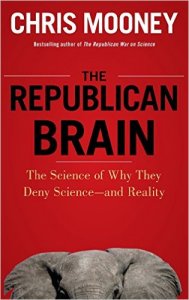 Mooney, Chris. 2012. The Republican Brain: The Science of Why They Deny Science and Reality. Wiley. ***
Mooney, Chris. 2012. The Republican Brain: The Science of Why They Deny Science and Reality. Wiley. ***
Why do people react to political and scientific issues differently? The book looks first at how variations in human personality traits lead to different takes about the world these variations being essential parts of humanity s evolutionary response to the world and then, secondarily, about how in our present society, those traits being more conservative have become less accurate takes on reality; how conservative ideas about science and reality are more often wrong than those of liberals. He discusses five standard personality traits (analogous to Haidt s moral intuitions) and how conservatives and liberals reflect different combinations of these; how conservatives view liberals; motivated reasoning; the doubling-down of smart idiots ; how both conservative and liberal attitudes are essential to the human condition, but how each side can learn from the other (pay attention to facts; abandon the idea of balance in the media; defend reality with stories that integrate facts and move people). (summary with my own comments about how science fiction is about change to the human condition while conservatism, almost by definition, resists change as a way of managing uncertainty and fear.) (Read Dec 2015)
 Mooney, Chris. 2005. The Republican War on Science. Basic. ***
Mooney, Chris. 2005. The Republican War on Science. Basic. ***
Journalist Mooney’s first book examines where Republican hostility to science came from. In a nutshell, it began in the late 1950s with its incursion into religious and business interests. Thus the antipathy toward regulations. The book is basically a litany of bad behavior, especially in the George W. Bush administration, e.g. Bush’s inaccurate claim about the number of existing stem-cell lines. In general, conservatism resists change, while the dynamism of science is a constant onslaught on old orthodoxies. Conservatives resort to various rhetorical tactics to try to undermine science, as in their term “sound science,” their repetition of “just a theory,” suppression of scientific reports, targeting individual scientists, rigging the process, misrepresenting results, magnifying uncertainty (“more research is needed”), relying on fringe “experts,” ginning up contrary “science,” and dressing up values in scientific clothing. Examples run from Reagan and Gingrich, to Bush, to paranoid distrust of intellectuals, to made-up controversies driven by religious motivations. The author, back in 2005, recommended dismantling legal standards for “sound science,” the Data Quality Act, and the notion of “peer review” linked to it. Journalists should resist the notion of “balanced” accounts that ignore overwhelming consensus, e.g. on climate change. And, overall, resist political gains by the modern Right. (2025 comment: these problems have only gotten much worse in the past 20 years.) (post) (Read Mar 2025)
 Newitz, Annalee. 2024. Stories Are Weapons: Psychological Warfare and the American Mind. Norton. ***
Newitz, Annalee. 2024. Stories Are Weapons: Psychological Warfare and the American Mind. Norton. ***
This is about psychological warfare in the US, which means deliberately spinning the truth or telling alternative narratives for political purposes. It goes back long before social media, but came to the fore in advertising and wartime propaganda. A surprise of the book is that one of the key players in these “psyops” was one Paul Linebarger, now best known for his mid-century science fiction published under the pseudonym Cordwainer Smith. Other psyops included the mythmaking by the US government to encourage westward expansion, in the 18th and 18th centuries, and more recently how Steven Bannon, and then the Russians, targeted those with fascist tendencies with slogans like “drain the swamp” and “make America great again.” Culture war issues have included Charles Murray’s attempt to link IQ and economic fates, Joe McCarthy and Anita Bryant’s moral panic over homosexuals since the 1950s, and Fredric Wertham’s war against comics that anticipated today’s battles over “wokeness.” Finally there are ideas for disarmament. Rediscover actual history, with an example of a tribe in Oregon once declared to be extinct. Fight propaganda online, with suggestions for regulating social media. And how the public library is a metaphor for a rejuvenated public sphere. (post) (Read Dec 2024)
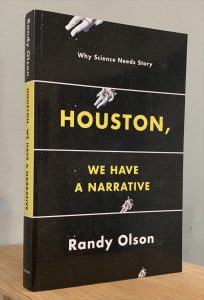 Olson, Randy. 2015. Houston, We Have a Narrative. University of Chicago. ***
Olson, Randy. 2015. Houston, We Have a Narrative. University of Chicago. ***
The author is a professor of marine biology who became a Hollywood filmmaker and then took the lessons he learned in Hollywood back to scientists, to tell them how to improve their press releases and article abstracts. How to avoid a dry recitation of facts (AAA) with a narrative (ABT: And, But, Therefore) while avoiding overcomplication (DHY: this Despite this However this Yet this). Along the way we hear about Joseph Campbell s Hero; thesis, antithesis, synthesis; word/sentence/paragraph; miniplot/archplot/anitplot; and why Al Gore s An Inconvenient Truth, and climate change in general, are boring. It s not a book about how to understand science through narrative; it s about using narrative to communicate scientific results to the public. (post) (Read Jul 2022)
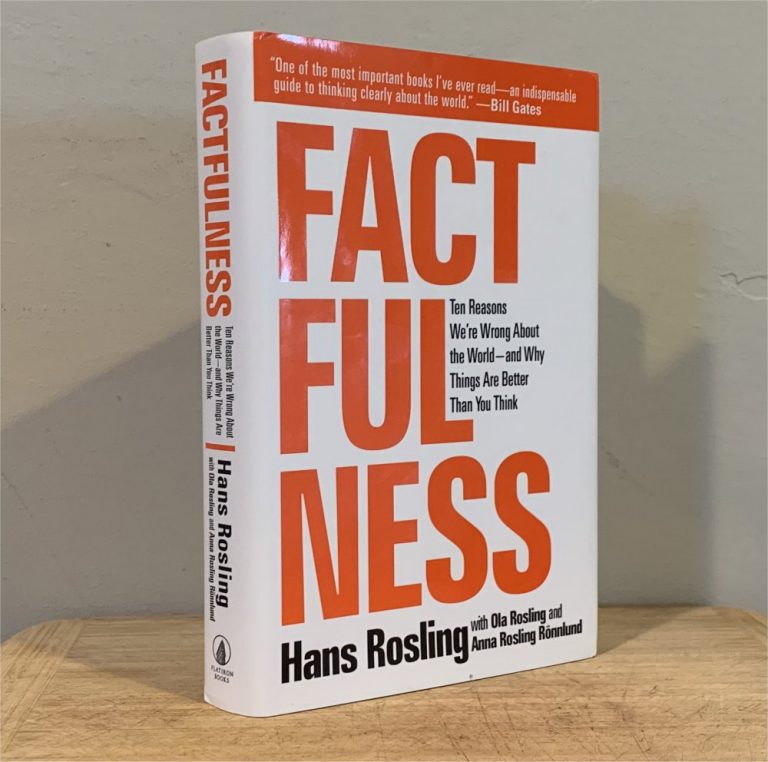 Rosling, Hans. 2018. Factfulness: Ten Reasons We’re Wrong About the World–and Why Things Are Better Than You Think. Flatiron Books. ****
Rosling, Hans. 2018. Factfulness: Ten Reasons We’re Wrong About the World–and Why Things Are Better Than You Think. Flatiron Books. ****
The late Swedish educator, cofounder of the Gapminder Organization, discovered through surveys that most people think the world is worse off than it is (poverty, life expectancy, etc.). This is due to various instincts [or psychological biases], explored in 10 chapters: about the gap instinct (how people divide the world into us and them ), negativity, the assumption that trends will continue in a straight line, the tendency to jump to the worst possible conclusion, and so on. The book is thus a complement to Pinker s Better Angels and various books about psychological biases, using less technical language. The key to overcoming these instincts is education, teaching children humility and curiosity, taking businesses global, being aware that journalists will always focus on the unusual and not the common. A specific suggestion is to abandon the split between developed and developing (or third world ) nations, but rather a distinction among four levels of income, from $2/day to over $32/day; of the world s 7 billion people, the divide is roughly 1, 3, 2, and 1 billion in those four levels. (post)
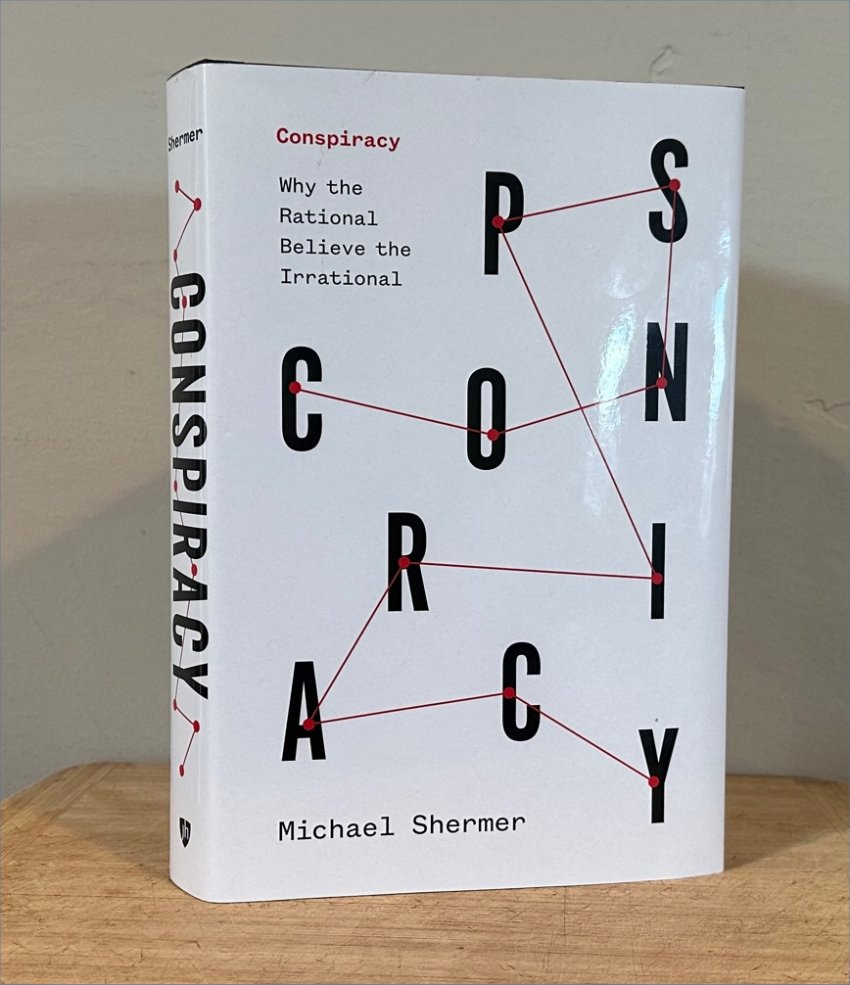 Shermer, Michael. 2022. Conspiracy: Why the Rational Believe the Irrational. John Hopkins. *** 1/2
Shermer, Michael. 2022. Conspiracy: Why the Rational Believe the Irrational. John Hopkins. *** 1/2
A solid, thorough look at why people fall for conspiracy theories. Much of it is familiar from other writing over the past 20 years, but several ideas are new (to me). First, that since a few conspiracy theories are true, it’s a legitimate strategy to see conspiracies everywhere rather than not see them all; seeing conspiracies is a feature, not a bug. (Rather like the overly-active pattern-seeking feature of human perception.) Second, Shermer distinguishes between proxy conspiracism, tribal conspiracism, and constructive conspiracism, and how people subscribe to conspiracies not because they “believe” them but because everyone else in their tribe believes them, or because of their animus toward the theory’s target. Third, conspiracy theorists used to point out “anomalies” in the evidence; these days they simply assert “a lot of people are saying ” or “rigged!” It’s pluralistic ignorance, signing loyalty to a tribe. And fourth, people who believe in government conspiracies do so in open meetings; in real autocracies, like North Korea, people could never do that. The balance of the book is filled with details and examples. He provides a “Conspiracy Detection Kit” modeled after Sagan’s “baloney detection kit”. He goes into considerable detail of 9/11 and Obama conspiracy theories. And he ends with two lists, one tools for confronting others (some resembling Boghossian’s, and Rauch’s), and how to “rebuild trust in truth” to counter the frequency of political lies. A second post quotes a long paragraph about moral progress and how scientific naturalism and enlightenment human have made the modern world, and a list of tenets for how this happened. (post)
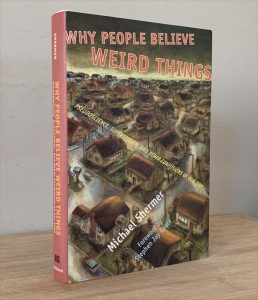 Shermer, Michael. 1997. Why People Believe Weird Things. Freeman. ****
Shermer, Michael. 1997. Why People Believe Weird Things. Freeman. ****
One of the earliest books to address human irrationality in terms of both evidence against various pseudoscientific beliefs and the psychological motivations that lead people to believe things that aren t true. Author discovered that people want to believe weird things (like psychics) and get angry when frauds are exposed. Skepticism is not cynicism; it s a method, embodied in the scientific method that has led over 400 years to the modern Western world. Still people believe things that lack evidence and plausibility. Shermer reviews the now familiar fallacies and biases. Then topics include Edgar Cayce, near-death experiences, encounters with aliens, witch crazes, Ayn Rand; evolution and creationism; Holocaust denial. (Shermer held religion for his next book.) Conclusion: people believe weird things because it feels good to believe them; they provide immediate gratification; they offer simplicity in a complex world; they imply morality and meaning; they offer comfort and hope. (post)
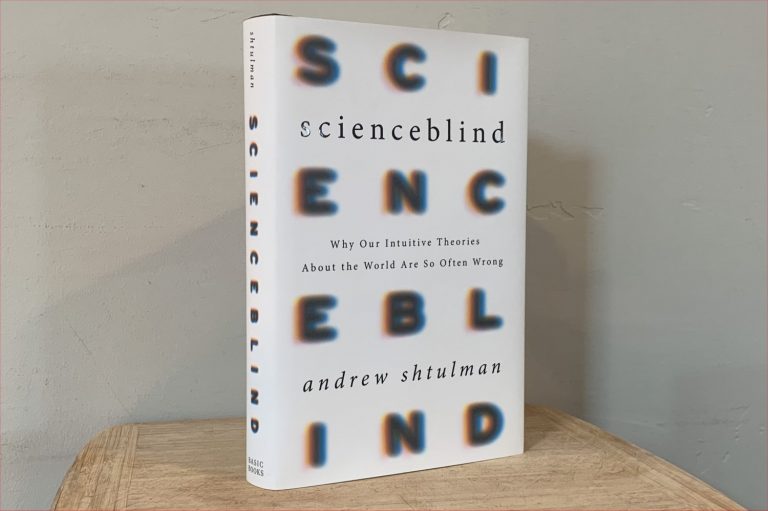 Shtulman, Andrew. 2017. Scienceblind: Why Our Intuitive Theories About the World Are So Often Wrong. Basic. ***
Shtulman, Andrew. 2017. Scienceblind: Why Our Intuitive Theories About the World Are So Often Wrong. Basic. ***
Why our naive common sense is frequently wrong: we learn to understand the world, as infants, at a scale that applies only locally. The book examines topics of matter, energy, gravity, motion, cosmos, earth, life, growth, inheritance, illness, adaptation, and ancestry, contrasting naive notions with scientific notions. Naive theories are anthropocentric; they re better than nothing, but scientific theories that get the world right help us thrive. (post)
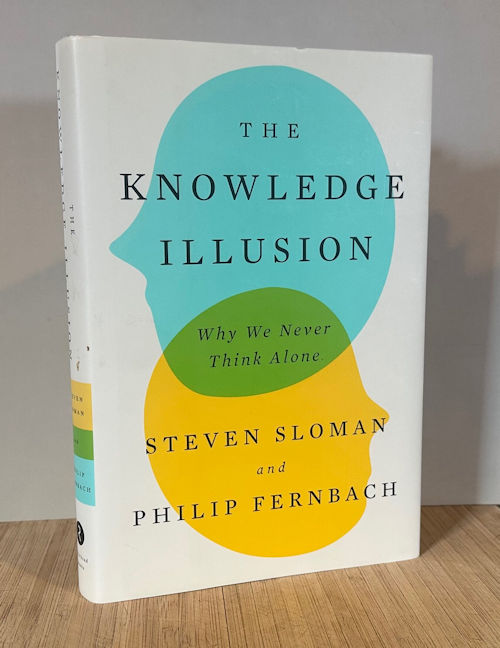 Sloman, Steven, & Fernbach, Philip. 2017. The Knowledge Illusion: Why We Never Think Alone. Riverhead. *** 1/2
Sloman, Steven, & Fernbach, Philip. 2017. The Knowledge Illusion: Why We Never Think Alone. Riverhead. *** 1/2
We live in a complex world, no one can know everything, and we depend on the knowledge of others. (I recall that Heinlein quote decrying specialists; he was wrong.) The three big themes here are ignorance, the illusion of understanding, and the community of knowledge. People overestimate how much they know, and we don’t actually remember much detail because the brain didn’t evolve to retain information; that information is mostly out there in the world itself, easily retrievable. We think in terms of cause and effect, but our na ve understanding of physics doesn’t correspond to reality. Hunting was a communal exercise, and in the modern world too we rely on experts to build everything around us. Technology extends thought by expanding knowledge held in the world. Opposition to science comes from lack of understanding, and also social pressures that inhibit people from changing their minds when new information comes available. In politics, the less informed people are, the stronger their opinions; they resort to ‘sacred values’ to avoid thinking about practical consequences. Being smart isn’t about IQ, but more about the degree one contributes to group success; it also involves activities, trust in the institutions and principles of science. Yet most people don’t want too much information; they prefer to rely on community beliefs of how things work. There will always be ignorance, and illusions; the latter may be necessary for the development of human civilization. Intelligence resides in the community, and our society has come far because most people cooperate most of the time. (post) (Read Feb 2025)
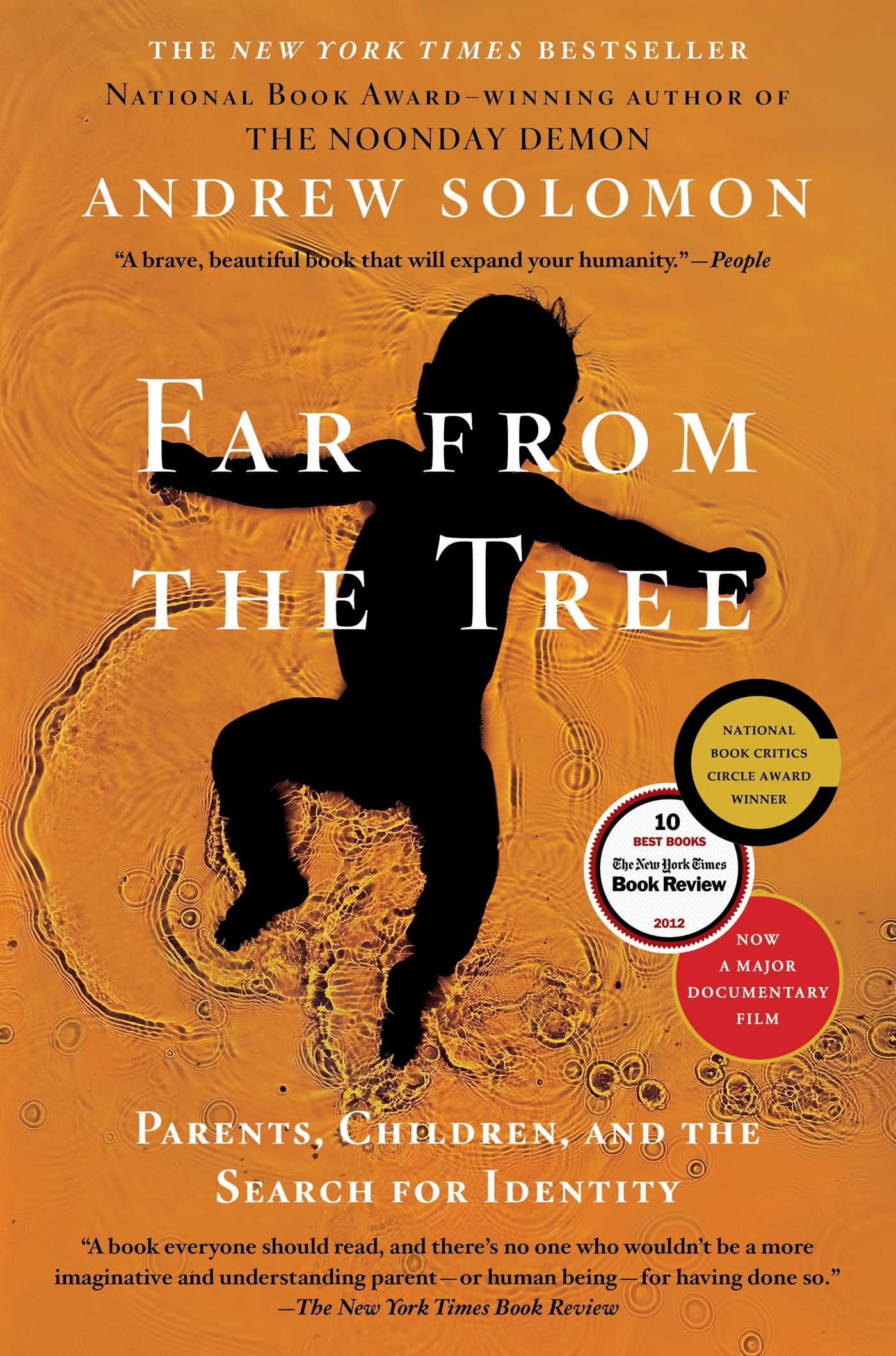 Solomon, Andrew. 2012. Far From the Tree: Parents, Children and the Search for Identity. Scribner. ****
Solomon, Andrew. 2012. Far From the Tree: Parents, Children and the Search for Identity. Scribner. ****
I read just portions of this: the opening and closing chapters, about Solomon s childhood and his own father, and then about his late-in-life decision to become a father, via surrogacy; and then chapters on autism (e.g. concerning the neurodiversity movement; the relationship of autism to creativity) and prodigies (considering here only musical prodigies; parental vs. public support). Solomon is a mesmerizing writer, blending results of studies and research with actual stories of hundreds of people he interviewed over 10 years. (post)
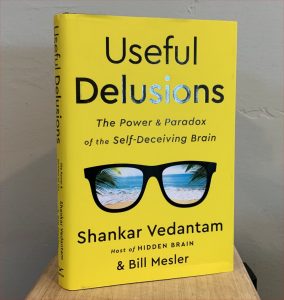 Vedantam, Shankar. 2021. Useful Delusions: The Power and Paradox of the Self-Deceiving Brain. Norton. ***
Vedantam, Shankar. 2021. Useful Delusions: The Power and Paradox of the Self-Deceiving Brain. Norton. ***
NPR correspondent Vedantam s book is another about how our perceptions and cognitions are molded by the evolutionary priority of survival, and not to accurately understand the real world. It s full of examples, including a long middle section about a con artist who d scammed hundreds of men via a direct-mail scheme, but who was *forgiven* by many of his victims when revealed. How to understand this? Because some kinds of delusions make us feel better, even when we know they re delusions; we welcome them. The book s thesis is, handily, summarized in the introduction: that self-deception might be functional, offering us hope and reassurance (which in turns are useful attitudes for survival). With examples of how the eye filters information, how the mind has layers, like those of ancient cities; how modern conflicts between tradition and modernity have parallels inside the brain. Our minds are not designed to see the truth, but to show us selective slices of reality, and to prompt us toward predetermined goals. Even worse, they are designed to do all this while giving us the illusion that we are seeing reality. There are obvious echoes of books by Hutson, Haidt, and others. (post) (Read Jun 2021)





